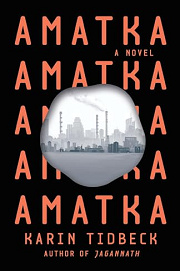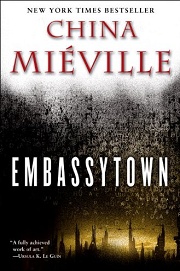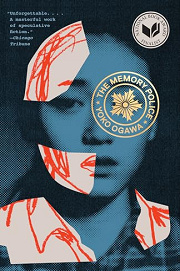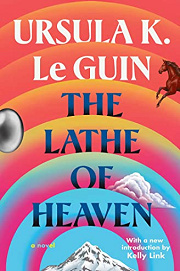Share your thoughts in a quick Shelf Talk!
Amatka by Karin Tidbeck
In a wintry colony where language literally shapes reality, a quiet clerk uncovers rules that don’t add up—and words that won’t behave. Amatka is a stark, uncanny tale of conformity and imagination, asking what we risk when we choose the truth over the safety of silence.
Have you read this book? Share what you liked (or didn’t), and we’ll use your answers to recommend your next favorite read!
Love Amatka but not sure what to read next?
These picks are popular with readers who enjoyed this book. Complete a quick Shelf Talk to get recommendations made just for you! Warning: possible spoilers for Amatka below.
In Amatka, did you enjoy ...
... the claustrophobic, reality-warping strangeness of a regimented place where the rules of the world feel unstable?
Annihilation by Jeff VanderMeer
If the way Amatka’s colony forces people to label “cup,” “bed,” and “door” to keep reality from slipping thrilled you, you’ll love how Area X in Annihilation quietly refuses to obey. As the Biologist descends the “tower” (that insists on being called a tunnel) and reads the living script on its walls, that same eerie, bureaucratic dread you felt when Vanja files her consumer survey under the Committee’s gaze intensifies into pure, luminous weird. It’s the same mood of rules that don’t quite hold—and the terror of what happens when they break.
... language as a force that shapes—and can shatter—reality?
Embassytown by China Miéville
In Amatka, words literally stabilize the world; stop “marking,” and objects decay. Embassytown pushes that obsession with language even further. Avice Benner Cho lives among the Ariekei, whose Language can only speak truth—until humans teach them to lie and everything fractures. If Vanja’s discovery that forbidden poems and naming practices can transform the colony hooked you, Miéville’s double-voiced aliens, living similes, and catastrophic linguistic contagion will scratch the same itch in a grand, mind-bending way.
... an oppressive regime enforcing forgetfulness and compliance through the erasure of everyday things?
The Memory Police by Yoko Ogawa
The Committee’s quiet terror in Amatka—the censored library, the surveillance of Vanja’s housing unit, the way dissent literally unravels the world—finds a haunting echo here. On an unnamed island, things vanish: first roses, then calendars, then birds. The Memory Police arrive to ensure everyone forgets, and a novelist hides her editor beneath her floorboards as objects—and lives—are erased. If the slow, suffocating dread of Amatka’s colony drew you in, this elegiac dystopia will burrow under your skin.
... a small, enclosed community unraveling through routines, reports, and intimate testimonies?
The Employees by Olga Ravn
If you loved living inside Amatka’s cramped dorms, the shared kitchen, the mandatory reports Vanja files, and the hushed conversations that hint at revolt, The Employees will feel uncannily familiar. Told through brief statements from a spaceship’s crew and humanoids after they bring strange “objects” aboard, it captures the same intimate pressure-cooker of work, compliance, and private longing—until language itself starts to drift and people change in ways they can’t explain.
... reality bending under human intention—and the moral questions of who gets to reshape it?
The Lathe Of Heaven by Ursula K. Le Guin
In Amatka, subversive words and names can literally remake the colony, and Vanja must decide what kind of world she’s willing to call into being. Le Guin’s classic poses a similar dilemma: George Orr’s “effective dreams” alter reality, and Dr. Haber tries to engineer a better world—with unintended consequences. If the final, reality-shifting acts in Amatka gripped you, watching Orr wrestle with the ethics of willing change into existence will resonate deeply.
Unlock your personalized book recommendations! Just take a quick Shelf Talk for Amatka by Karin Tidbeck. It’s only a few questions and takes less than a minute.





